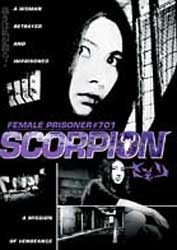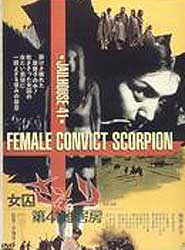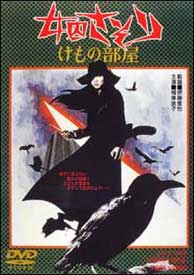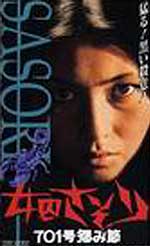 Based on an X-rated adult manga series (comics), the sensationally beautiful star of the Lady Snowblood films, gets to act tough in the crudely violent Female Convict Scorpion series. She spends most of her time being tortured or gang-raped, however, so these are not the kind of heroic films encountered with the two Snowblood movies, wherein female power is not given such a demeaning context as female helplessness. Based on an X-rated adult manga series (comics), the sensationally beautiful star of the Lady Snowblood films, gets to act tough in the crudely violent Female Convict Scorpion series. She spends most of her time being tortured or gang-raped, however, so these are not the kind of heroic films encountered with the two Snowblood movies, wherein female power is not given such a demeaning context as female helplessness.
Kaji Meiko as the Scorpion is defiant in prison thus very badly treated. No matter what they do to her, her iron will won't break, giving the scriptwriter & filmmaker ample opportunity to show her tortured once more, then once again, & so on. In 1972, this level of sexual violence was uncommon even in Japanese films, & certainly rare in America outside of snuff films.
Sometimes Japanese films pack in the exploitation elements & still manage to tell an interesting story about a powerful heroine, but this one's good moments are few & far between, leaving it nearly purely exploitative. It's mainly for torture fans & women-in-prison fetishists, being much closer to brutal pornography than an action film.
There are probably no women-in-prison films as sadistic as these, & certainly never a star in such films as beautiful as Kaji Meiko. She was still a relative unknown when these films were made. Her starring vehicle as Lady Snowblood would make her reputation reach further than the sexploitation audience, & she would never again have to resort to the worst kinds of films that launched her as an actress.
For sadistic &/or masochistic porn hounds, the star's bad luck early in her early career is the great good luck of masturbators. Those of her films which have tremendous artistic integrity & beauty (such as Double Suicide of Sonezaki in 1978, with Kaji Meiko at the very height of her amazing beauty, giving a veritably Shakespearean tragic performance) are not as well known in the west where "Asian trash cinema" gets better distribution than anything of tremendous quality outside of Kurosawa.
Those of us who want Scorpion to be a female version of Cool Hand Luke can find a few things in the corners of these films to appreciate, but really there isn't much. The first of the series is highlighted by lesbian sadism behind bars, & plenty of hetero sadism against the heroine as well. There's no story to speak of. The series wants it two ways, she is "innocently" imprisoned by the evil cop boyfriend, but really she did attempt to murder him, so it's not like she shouldn't've been imprisoned.
But she certainly didn't deserve the endless torture in addition to imprisonment, so on a comparative scale, despite her own penchant for violence that keeps getting her punished, on the relativity scale she is a pure soul spattered by the impurity of the people around her. If she exhibits any real heroism beyond being a good "bottom" for endless torture, it's her grim sense of justice in a world where justice is largely unknown.
Obviously director Shunya Ito wanted to create art-porn & provides excellent cinematography with manga-inspired framing of the pictorial content. He also wrote the recurring theme song "Urami-Bushi" which became a big hit song sung by Kaji Meiko herself, & which in Tarantino's Kill Bill. Meiko's other great hit is "Shura no Hana" from Lady Snowblood also replayed in Kill Bill.
The first Scorpion movie was the director's first film, & would seem to be as marked by his vision as by manga artist Tooru Shinohara (creator also of the Oka-no-Onna "Zero Woman Assassin" series filmed through the 1990s). The director also seems to have learned quite a bit about visuals during the filming of the first installment, because Part II is a visual improvement, even though the story (such as it is) is merely more-of-same.
 In Jailhouse 41 the virtually mute "strong & silent" Scorpion Matsu has been living in solitary confinement perpetually hogtied, due to her rebellious nature & her ability to inspire other women in the prison. Even tied up, she has been sharpening a spoon by holding it in her teeth & rubbing it on the concrete floor, so you just know trouble's a brewing for someone. In Jailhouse 41 the virtually mute "strong & silent" Scorpion Matsu has been living in solitary confinement perpetually hogtied, due to her rebellious nature & her ability to inspire other women in the prison. Even tied up, she has been sharpening a spoon by holding it in her teeth & rubbing it on the concrete floor, so you just know trouble's a brewing for someone.
She is cleaned up & temporarily released into the general population because of a pending inspection, which following her further rebellion & torture finally gives her the opportunity to escape with other women. Gang rape & torture are so much the focus that the moments of Scorpion's revenge or antiheroic character really seem beside the point, the degrading misogyny of the thing runs very deep. The most violently misogynist film by Dario Argento does not equal this, but then, neither do the women he puts in such positions match Kaji Meiko's glowering menace & beauty. And the infamously violent imagery of Takashi Miike in films like Ichi the Killer have a greater mutuality, not to mention faggotiness, being not about women but about beautiful violent men.
On a relative scale of things, the second film is the best of the lot. Bondage & Discipline freaks invariably adore it, as do trash cinema geeks. There may not be quite enough of a story for it to amount to much else, but sometimes that's enough.
 The third in the series Beast Stable is the last directed by Shunya Ito, who seems to have started to wonder himself if Scorpion Matsu had any nuance to her character. As the story opens, handcuffed Scorpion finds herself forced to cut off the arm of a policeman in order to escape further injustice, so you just know they're never going to stop coming after her. The third in the series Beast Stable is the last directed by Shunya Ito, who seems to have started to wonder himself if Scorpion Matsu had any nuance to her character. As the story opens, handcuffed Scorpion finds herself forced to cut off the arm of a policeman in order to escape further injustice, so you just know they're never going to stop coming after her.
Compared to the first two episodes, quite a bit is revealed about her character, the focus is not exclusively on torture though it's still the central theme, & she is not quite so close to mute this time through.
 She's out of prison but pursued by a tough-guy detective. The criminal underworld won't let her live in peace, & after she kills a yakuza gang boss, she & the friends who have been hiding her are in deep doodoo. Scorpion's prostitute friend is pregnant by her retarded brother who goes stalking the streets for rape victims if his sister refuses him. This subplot & the character of the gender-bent pimp seem to exist strictly to up the ante of sexual deviance. She's out of prison but pursued by a tough-guy detective. The criminal underworld won't let her live in peace, & after she kills a yakuza gang boss, she & the friends who have been hiding her are in deep doodoo. Scorpion's prostitute friend is pregnant by her retarded brother who goes stalking the streets for rape victims if his sister refuses him. This subplot & the character of the gender-bent pimp seem to exist strictly to up the ante of sexual deviance.
The fourth & final film Grudge Song with a new director is the most haphazard of the set. As with the third film, it attempts to be less all-out sadism-porn, & the script tries to tell a story of Scorpion Matsu's attempt at finding love even as the police pursue her. No one's heart is in the thing & even Kaji Meiko is having trouble working up the hatred-in-her-eyes gaze.
In 1976 the series continued with Yumi Takigawa as Matsu in New Female Convict Scorpion (Shin Joshu Sasori: 701-go) & in 1977 with Yoko Natsuki in the sixth installment Shin Joshu Sasori Takushobu X. I've never seen these, but no one praises them, so I probably wouldn't bother, since without Kaji Meiko who cares. There was a remake in 1991 & a new series in 1997 & 1998 for a grand total of ten films about this manga character.
copyright © by Paghat the Ratgirl
|




 She's out of prison but pursued by a tough-guy detective. The criminal underworld won't let her live in peace, & after she kills a yakuza gang boss, she & the friends who have been hiding her are in deep doodoo. Scorpion's prostitute friend is pregnant by her retarded brother who goes stalking the streets for rape victims if his sister refuses him. This subplot & the character of the gender-bent pimp seem to exist strictly to up the ante of sexual deviance.
She's out of prison but pursued by a tough-guy detective. The criminal underworld won't let her live in peace, & after she kills a yakuza gang boss, she & the friends who have been hiding her are in deep doodoo. Scorpion's prostitute friend is pregnant by her retarded brother who goes stalking the streets for rape victims if his sister refuses him. This subplot & the character of the gender-bent pimp seem to exist strictly to up the ante of sexual deviance.